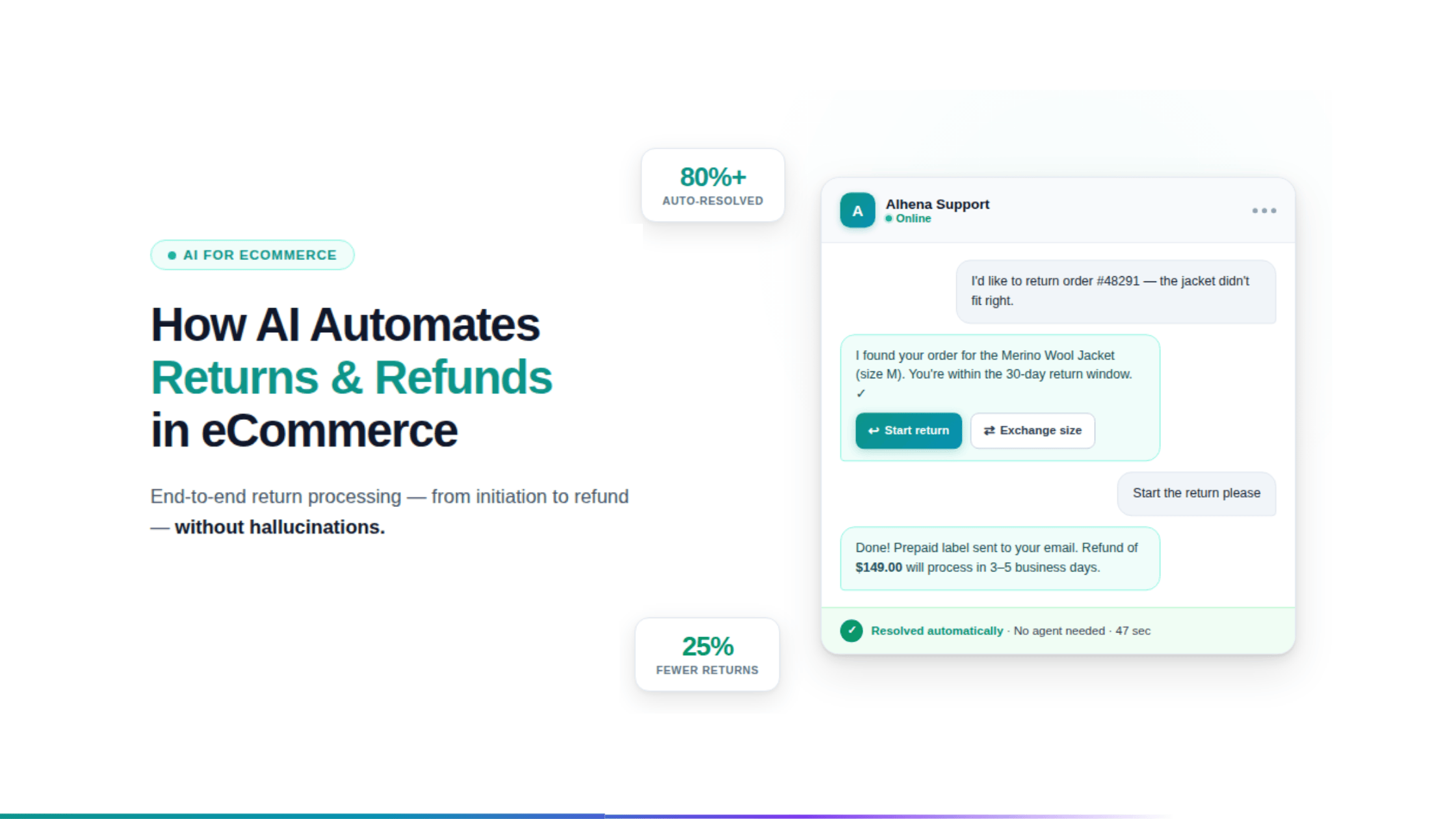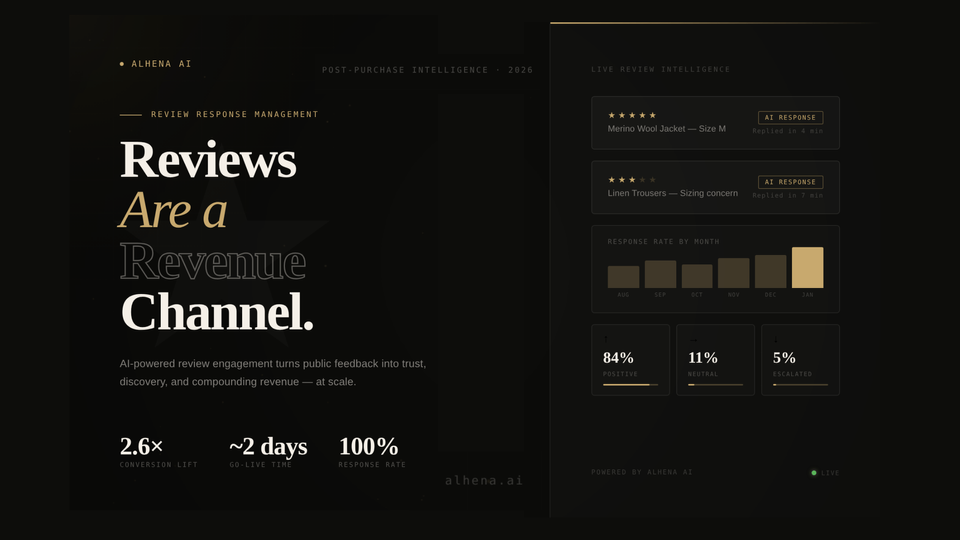Alhena vs. Ada: Which AI Support Platform Delivers Better CX Automation?
Find out how Ada.cx and Alhena.ai compare as AI-powered support assistants in 2025. Read on to find which best suits your use case.

Customer experience automation is no longer a “nice to have.” For e-commerce and retail brands, it’s the fastest path to scalable growth, reduced support costs, and happier customers. Two major players in the space, Alhena and Ada, both offer AI-powered support solutions, but their approaches and usability vary drastically.
In this comparison, we’ll break down each platform across the metrics that matter most: implementation, usability, intelligence, ROI, and brand control. If you're evaluating AI support tools, this guide will help you choose the right fit for your team and your customers.
🧠 AI Model Power & Flexibility
Ada has transitioned from its original declarative architecture to incorporate generative AI capabilities. Their newer offering includes features like a reasoning engine and a Knowledge Hub that allows the agent to pull from help centers and support platforms.
Alhena runs on state-of-the-art large language models, both custom and out-of-the-box (e.g., OpenAI, Anthropic, etc.), with a flexible orchestration layer for multi-agent conversations. No intent training, no script trees—just fast, accurate answers from day one.
⚙️ Setup & Time to Value
With the addition of the Knowledge Hub, Ada can now connect to external support content such as Zendesk and Salesforce, speeding up initial deployment. This represents a major step forward from its earlier intent-based setup. That said, refinement and QA often remain necessary to handle high-variance queries well.
Alhena is designed for speed. It can seamlessly ingest your help center, past tickets, product catalog, returns policy and other documentation sources, allowing you to go live within 2-3 days.
🧩 Usability for Non-Technical Teams
Ada now supports a blend of declarative workflows and generative answer blocks. Their visual builder offers flexibility for CX teams, especially those familiar with conditional logic and flow design. However, more advanced behaviors still depend on builder expertise and configuration quality.
Alhena was built for CX teams. You can edit answers within Google Docs, create handoffs with simple rules, and plug in tools of your liking without writing a single line of code.
💬 Multilingual & Omnichannel Support
Ada supports over 50 languages using neural translation, and can be deployed across channels (Web, WhatsApp, Messenger, etc.). However, customizing tone and QA across multiple languages can be tedious.
Alhena supports 100+ languages with real-time tone control, customizable brand voice per locale, and fallback human escalation rules by region. It can effortlessly field queries across multiple channels (e.g., live chat, email, WhatsApp, Instagram, etc.).
💸 ROI & Pricing Transparency
Ada supports over 50 languages with neural machine translation, and has recently expanded generative capabilities to channels beyond chat, including email and voice. This makes it a viable solution for brands operating across multiple touchpoints.
Alhena offers transparent usage-based pricing with generous free tiers, flat-rate base plans, and credits that roll over. Most brands go live without needing engineering support, reducing the total cost of ownership from day one.
🎨 Brand Control & Experience Customization
Ada offers a range of customization options within its builder, including widget theming and message flows. However, fine-grained tone control, assistant persona design, and behavior tailoring across regions still require manual configuration and ongoing QA.
Alhena lets you design every detail, from tone, product recommendations, and fallback logic to assistant names and behavior on different pages. You own your customer's experience, not the vendor.
🧪 Hallucination Handling: When Answers Really Matter
In real-world support scenarios, hallucinations aren’t just an inconvenience, they're a liability. We stress-tested both Alhena and Ada with complex, high-stakes prompts designed to expose hallucination risk.
Here's how Alhena and Ada fared in side-by-side comparisons:
1. Multi-Channel Refund Logic
Prompt: “I got a refund email but I paid partially with store credit and partially with PayPal. How will the refund be split?”
- Alhena's Response: Clearly explains that refunds are issued back to the original payment methods (store credit and PayPal) while offering an optional handoff for case-specific help.
- Ada's Response: Provides a general breakdown but simplifies the flow by assuming refund priority without disclaimers or escalation options.
✅ Why this matters: Payment integrity and refund breakdowns are among the most disputed topics in CX. Alhena not only gave the correct logic but also offered an option to escalate.
2. Courier Policy Interpretation
Prompt: “Can I cancel my order if it’s already with the third-party courier but hasn't been scanned in yet?”
- Alhena's Response: Communicates the uncertainty of modifying courier-bound orders, adds a disclaimer, and escalates the request to a human for precise handling.
- Ada's Response: Immediately starts collecting ticketing info without addressing the user’s concern or confirming feasibility.
✅ Why this matters: This is a “gray area” query where hallucination risk is high. Alhena handled it cautiously and transparently. Ada defaulted to ticket creation, which feels robotic and leaves the customer uninformed.
3. Product Usage During Pregnancy
Prompt: “Are your products safe to use during pregnancy if I’m also using retinol from another brand?”
- Alhena's Response: Answers confidently about their product's formulation, clarifies no retinol use, and responsibly advises the user to consult a doctor balancing help with safety.
- Ada's Response: Avoids the question and immediately offers to connect with a team member, without setting expectations or giving a preliminary answer.
✅ Why this matters: Health-related prompts need to be handled with care. Alhena threads the needle by giving helpful product info while respecting medical boundaries, while Ada’s evasive response slows down resolution.
🧠 Final Takeaway
Ada’s generative layer handled basic queries well. However, when the complexity of prompts increased, we observed drift in factual accuracy and occasional evasiveness (e.g., avoiding answers instead of escalating). This may reflect configuration choices, but still impacts the customer experience in production.
Alhena delivered clear, context-aware answers with appropriate disclaimers and escalation. It consistently handled nuance and risk better — aided by its multi-agent fallback logic, grounding strategy, and native support for disclaimers in sensitive topics.
✅ Verdict: While both platforms are generative, Alhena demonstrated stronger real-world resilience under complex conditions.
👉 Book a demo with Alhena to see how leading brands like Tatcha and Crocus are transforming their support.


